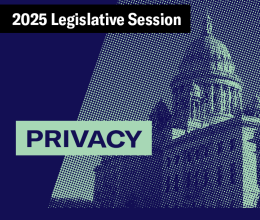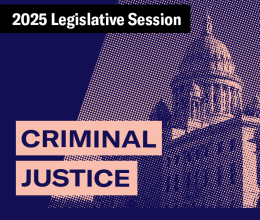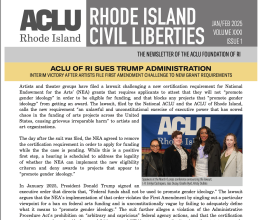The ACLU of Rhode Island today filed an “open records” lawsuit against the Providence Police Department, challenging its refusal to turn over any documents relating to police use of video camera surveillance in public places. The suit, filed in R.I. Superior Court by ACLU volunteer attorney Staci Kolb, seeks a court order requiring release of the records, and the imposition of fines and an award of attorneys fees against the Department. The lawsuit comes exactly one week after the ACLU issued a report that documented widespread non-compliance with the state’s Access to Public Records Act by government agencies, and particularly by police departments.
On August 9th, the ACLU sent an open records request to Providence Police Chief Dean Esserman, seeking copies of any guidelines or procedures relating to the use of video surveillance cameras in public locations in Providence, including “policies that address such issues as posting requirements that surveillance is occurring, and tape access and retention standards.” The ACLU received no response within the ten day period established by law for responding to open records requests. A follow-up letter similarly went unanswered, prompting today’s lawsuit. Coincidentally, while the request was pending, Chief Esserman issued a press release indicating that video surveillance cameras were being used by police at the Chad Brown Housing Community.
This is at least the sixth open records lawsuit filed over the years by the ACLU against the Providence Police Department. Pending in Superior Court is an ACLU request for attorneys fees against the Department in a virtually identical case where the City initially refused to release its policies governing the use of police cruiser cameras. A court ordered their release.
The ACLU will seek to have the lawsuit heard on an expedited basis, as authorized by the open records law.
ACLU attorney Kolb said today: “This case is particularly troublesome. First, the Providence Police Department has simply ignored the ACLU’s two separate requests for public records. Fortunately, in this instance, the ACLU has the resources to file a lawsuit to correct this wrong. However, individual members of the public may not, and as a result, such people would be denied public information they have a right to know. Equally disturbing is that this lawsuit is virtually identical to one filed by the ACLU in 2000, where the court ordered the Providence Police Department to provide to the ACLU the same type of policies requested here. I believe that as a result of this conduct, the public is left to question the police department’s dedication to complying with the Access to Public Records Act.”






